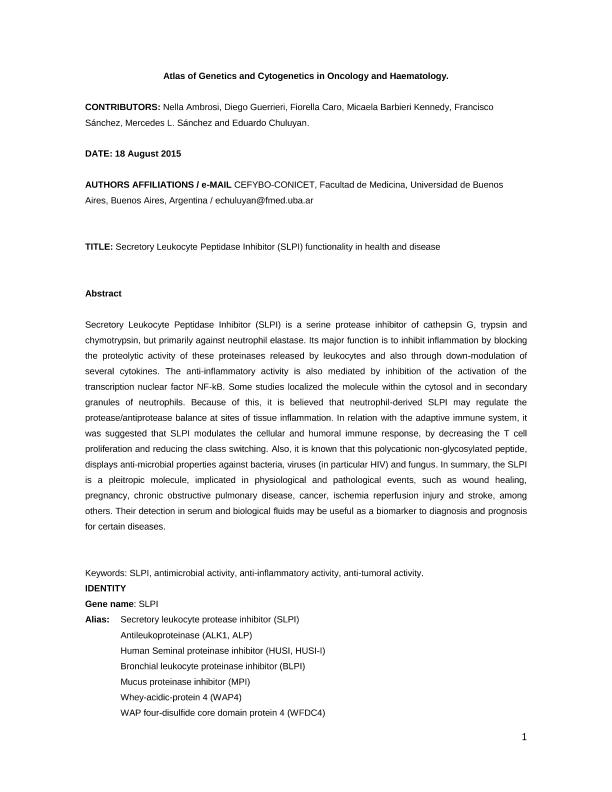Artículo
SLPI (secretory leukocyte peptidase inhibitor)
Ambrosi, Nella Gabriela ; Guerrieri, Diego
; Guerrieri, Diego ; Caro, Fiorella Yanina
; Caro, Fiorella Yanina ; Barbieri Kennedy, Micaela; Sanchez, Francisco
; Barbieri Kennedy, Micaela; Sanchez, Francisco ; Sanchez, Mercedes Leonor
; Sanchez, Mercedes Leonor ; Chuluyan, Hector Eduardo
; Chuluyan, Hector Eduardo
 ; Guerrieri, Diego
; Guerrieri, Diego ; Caro, Fiorella Yanina
; Caro, Fiorella Yanina ; Barbieri Kennedy, Micaela; Sanchez, Francisco
; Barbieri Kennedy, Micaela; Sanchez, Francisco ; Sanchez, Mercedes Leonor
; Sanchez, Mercedes Leonor ; Chuluyan, Hector Eduardo
; Chuluyan, Hector Eduardo
Fecha de publicación:
08/2015
Editorial:
University Hospital of Poitiers
Revista:
Atlas of Genetics and Cytogenetics in Oncology and Haematology
ISSN:
1768-3262
Idioma:
Inglés
Tipo de recurso:
Artículo publicado
Clasificación temática:
Resumen
Secretory Leukocyte Peptidase Inhibitor (SLPI) functionality in health and disease: Secretory Leukocyte Peptidase Inhibitor (SLPI) is a serine protease inhibitor of cathepsin G, trypsin and chymotrypsin, but primarily against neutrophil elastase. Its major function is to inhibit inflammation by blocking the proteolytic activity of these proteinases released by leukocytes and also through down-modulation of several cytokines. The anti-inflammatory activity is also mediated by inhibition of the activation of the transcription nuclear factor NF-kB. Some studies localized the molecule within the cytosol and in secondary granules of neutrophils. Because of this, it is believed that neutrophil-derived SLPI may regulate the protease/antiprotease balance at sites of tissue inflammation. In relation with the adaptive immune system, it was suggested that SLPI modulates the cellular and humoral immune response, by decreasing the T cell proliferation and reducing the class switching. Also, it is known that this polycationic non-glycosylated peptide, displays anti-microbial properties against bacteria, viruses (in particular HIV) and fungus. In summary, the SLPI is a pleitropic molecule, implicated in physiological and pathological events, such as wound healing, pregnancy, chronic obstructive pulmonary disease, cancer, ischemia reperfusion injury and stroke, among others. Their detection in serum and biological fluids may be useful as a biomarker to diagnosis and prognosis for certain diseases.
Archivos asociados
Licencia
Identificadores
Colecciones
Articulos(CEFYBO)
Articulos de CENTRO DE ESTUDIOS FARMACOLOGICOS Y BOTANICOS
Articulos de CENTRO DE ESTUDIOS FARMACOLOGICOS Y BOTANICOS
Citación
Ambrosi, Nella Gabriela; Guerrieri, Diego; Caro, Fiorella Yanina; Barbieri Kennedy, Micaela; Sanchez, Francisco; et al.; SLPI (secretory leukocyte peptidase inhibitor); University Hospital of Poitiers; Atlas of Genetics and Cytogenetics in Oncology and Haematology; 8-2015
Compartir



